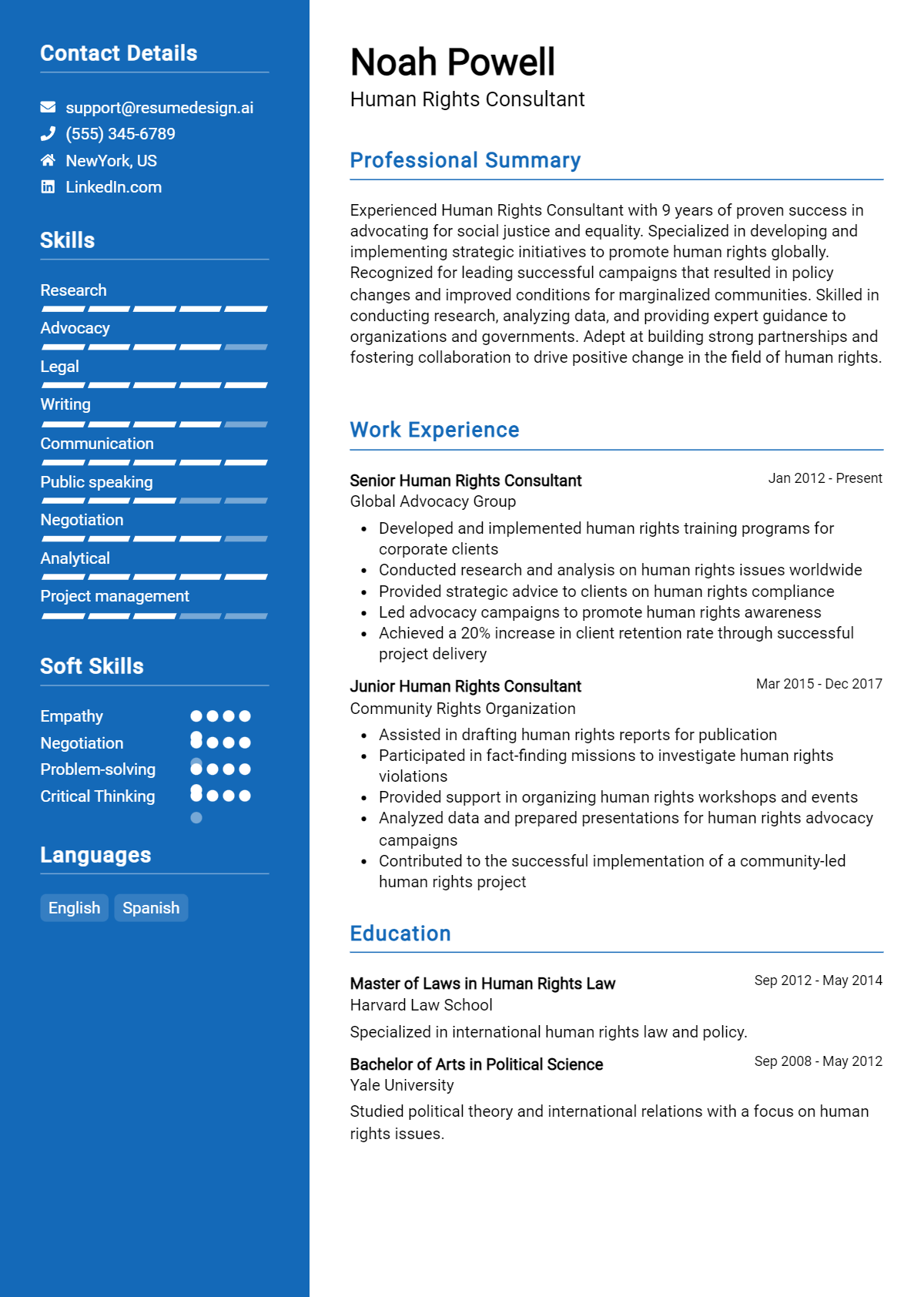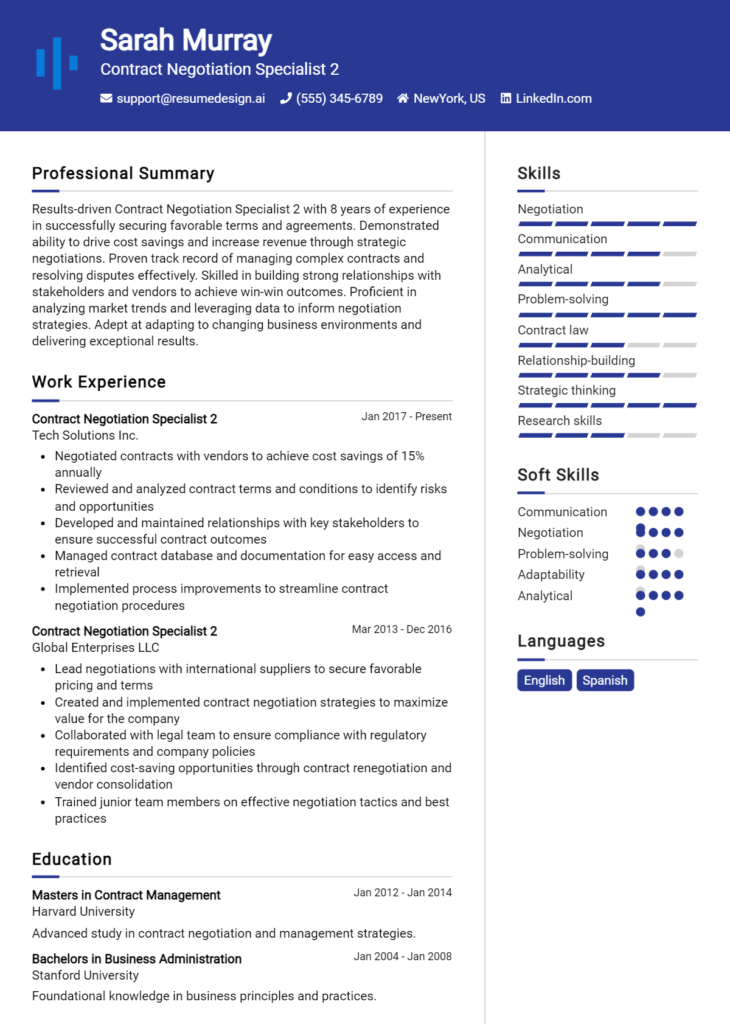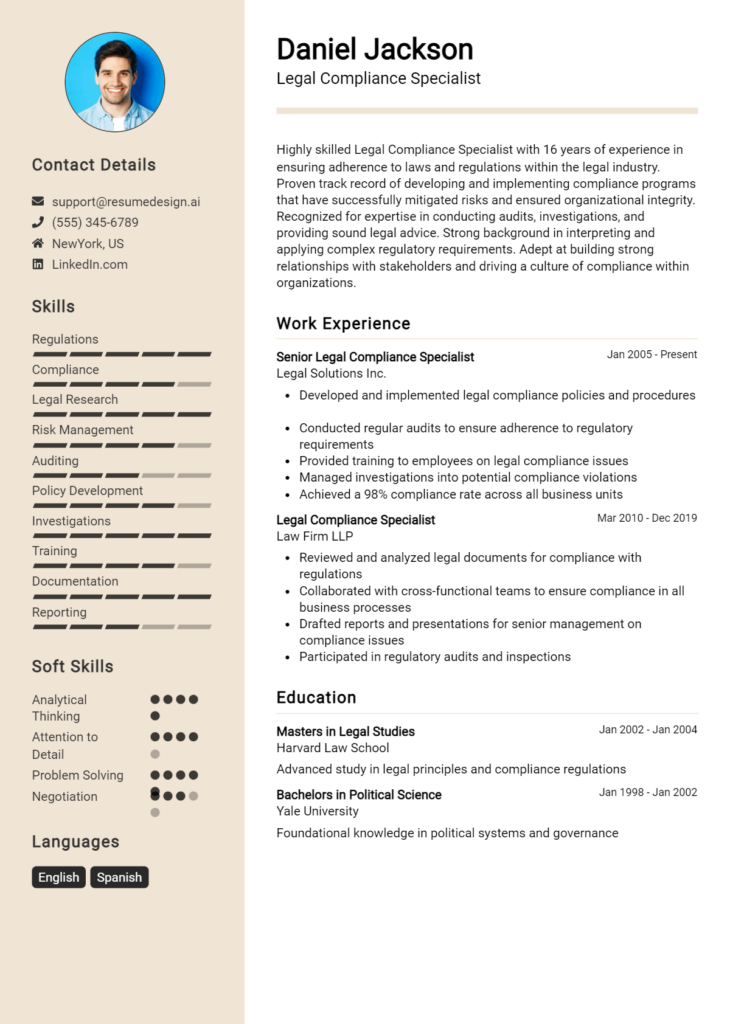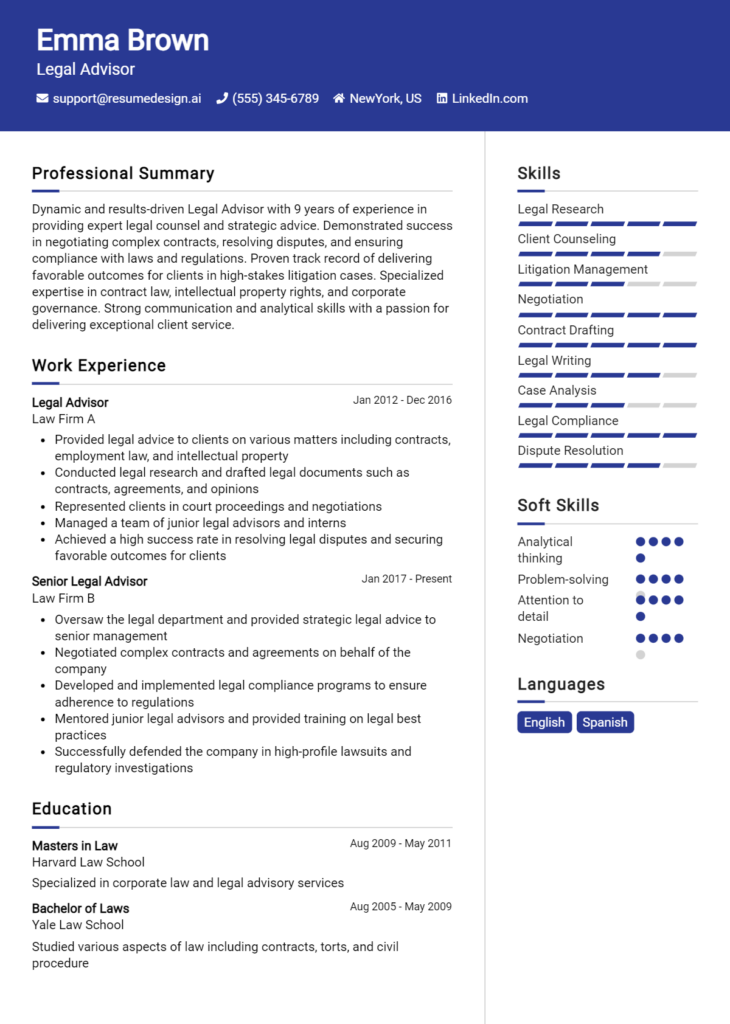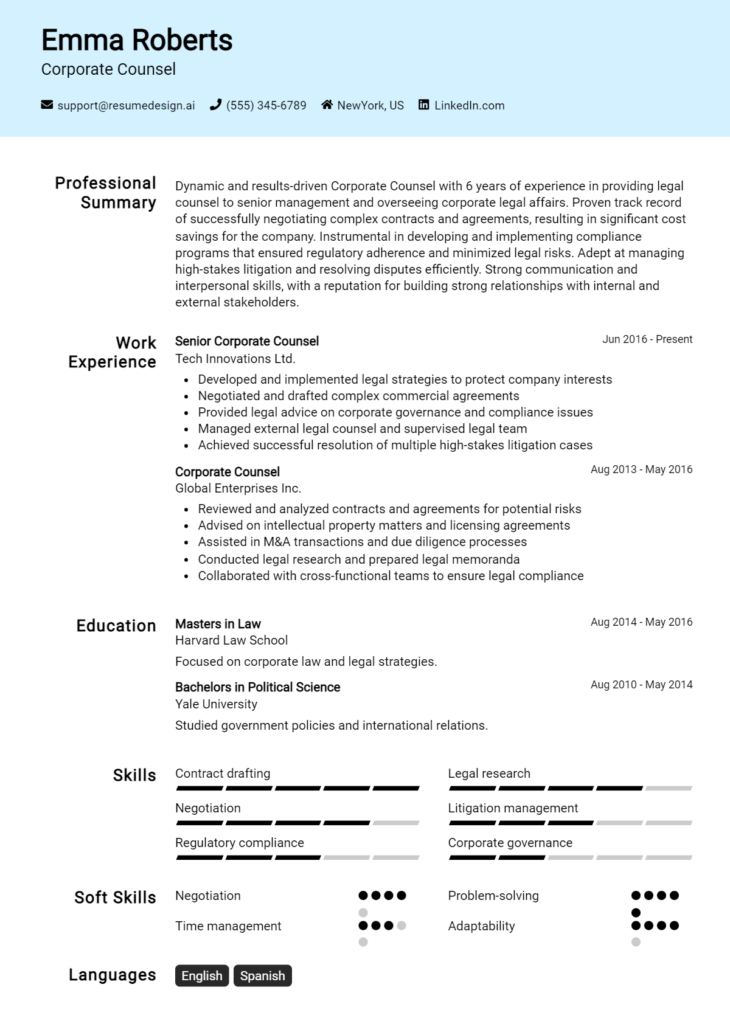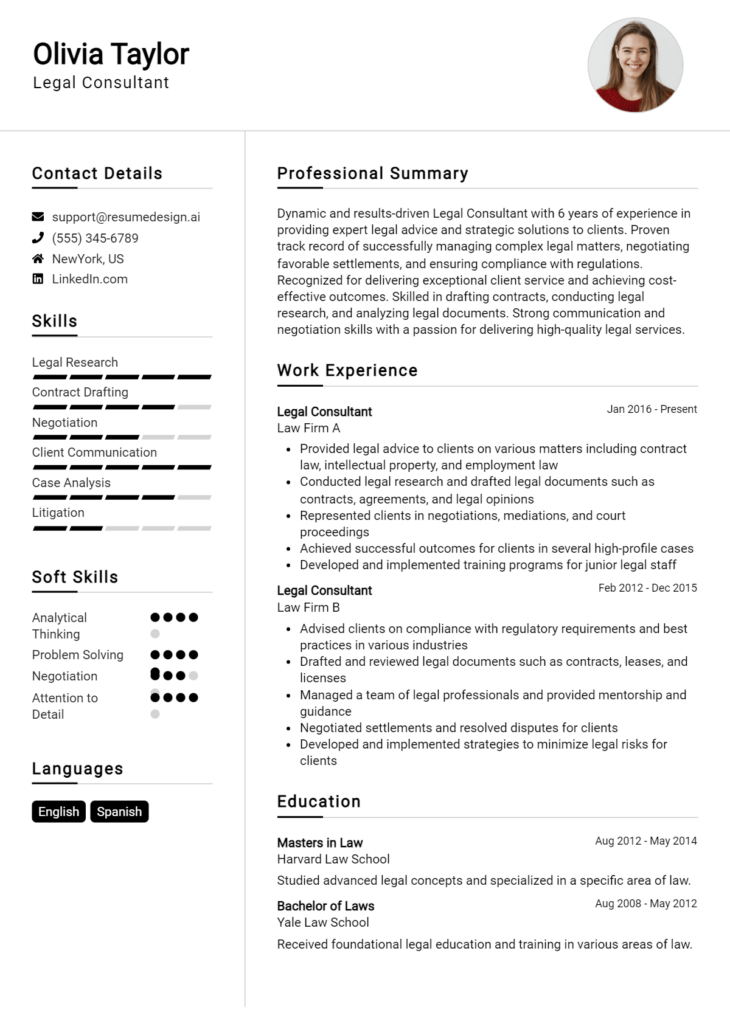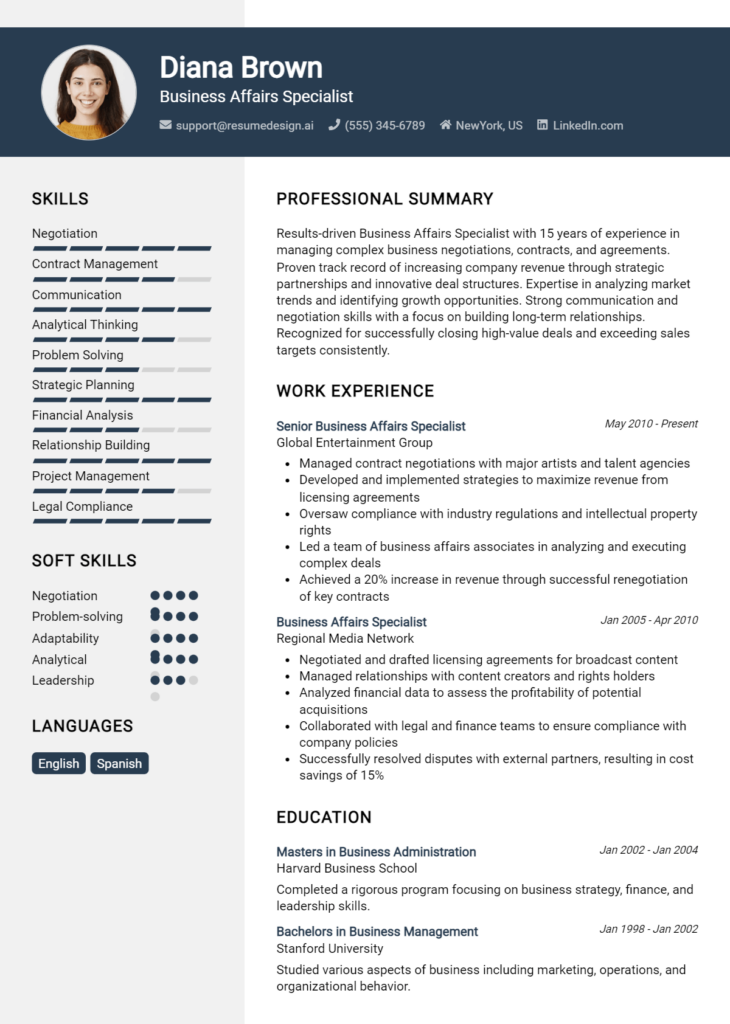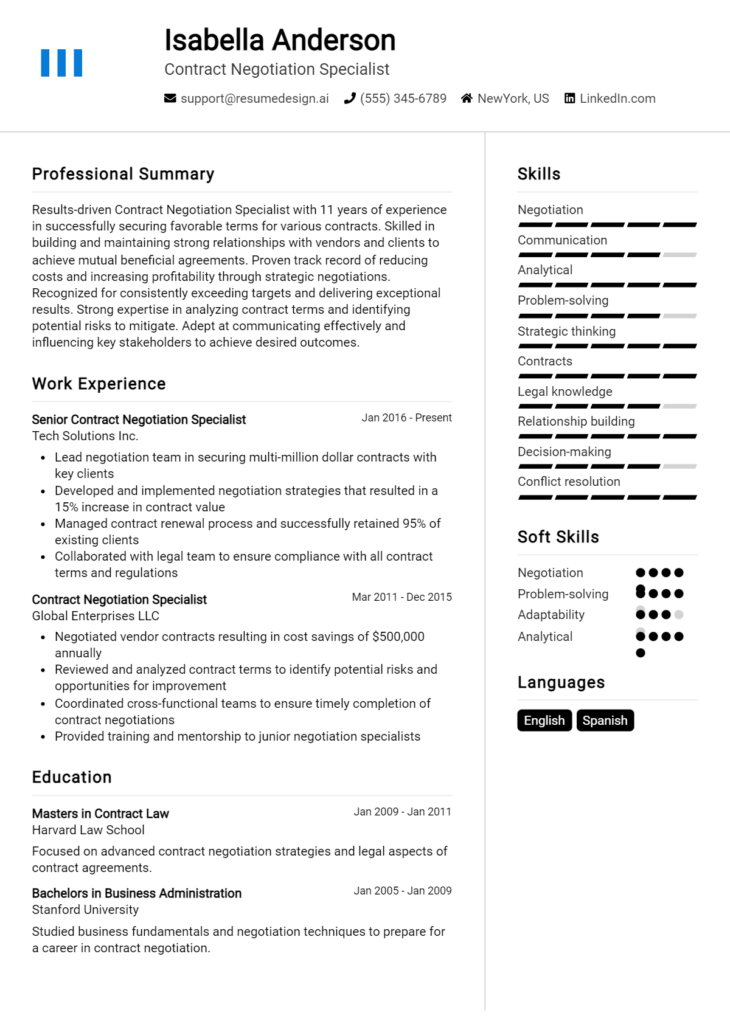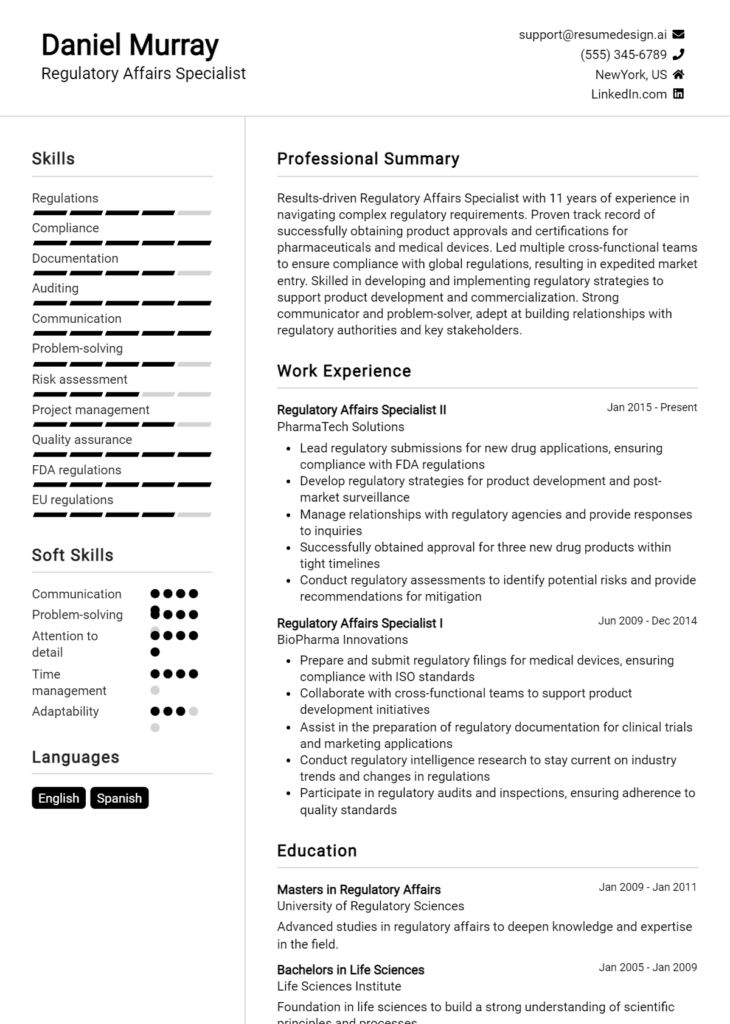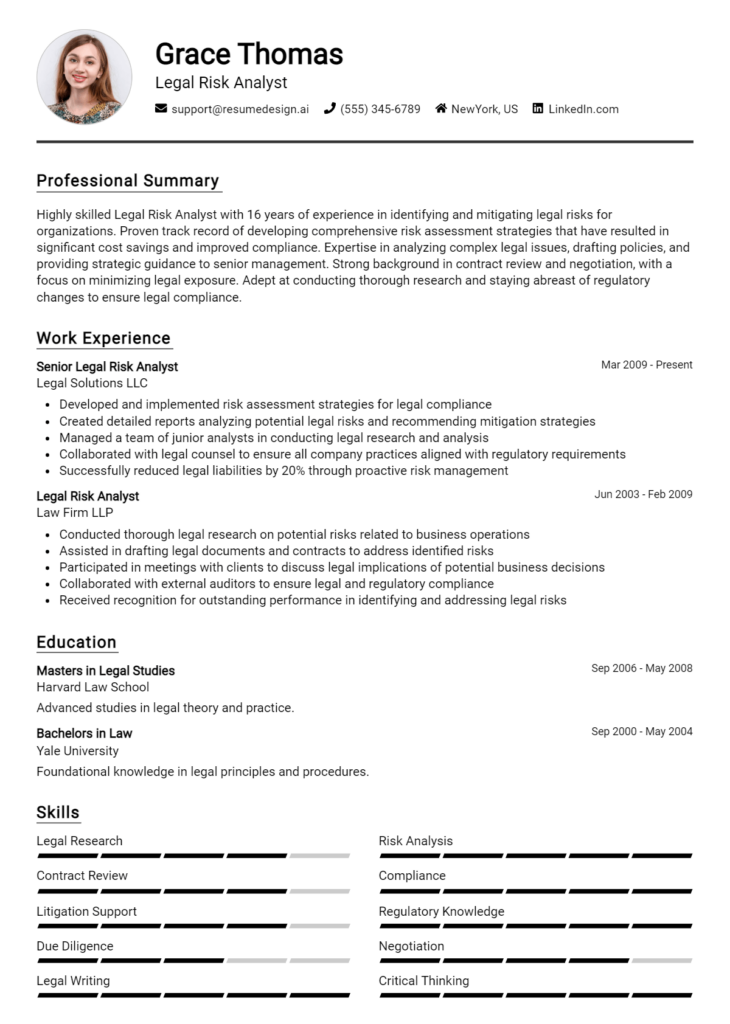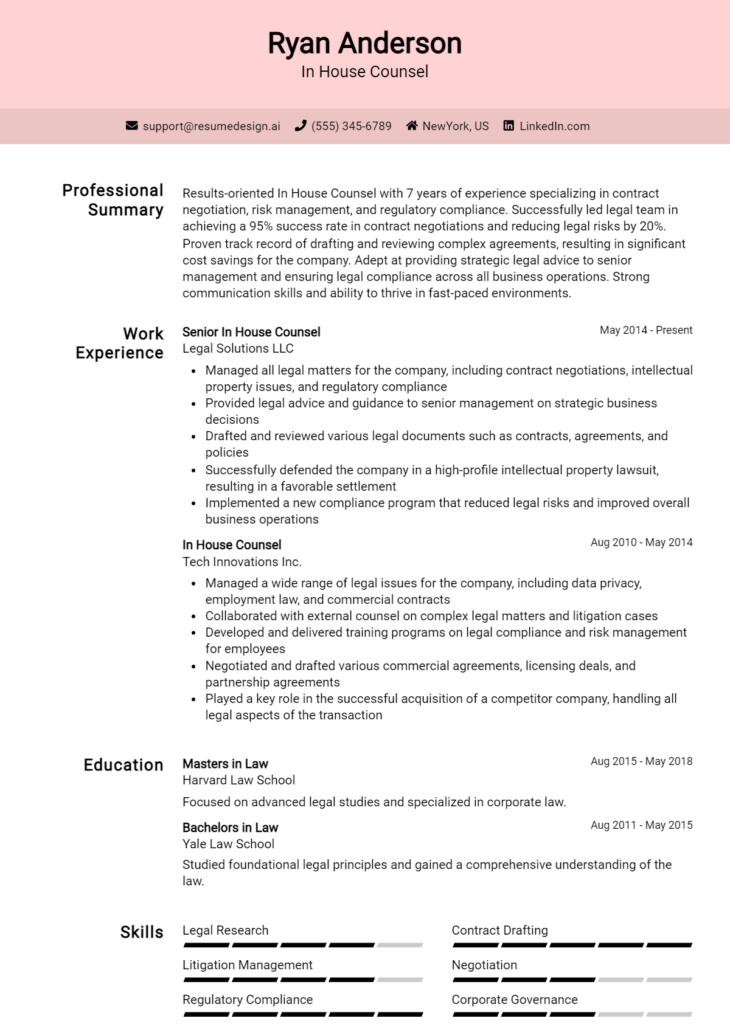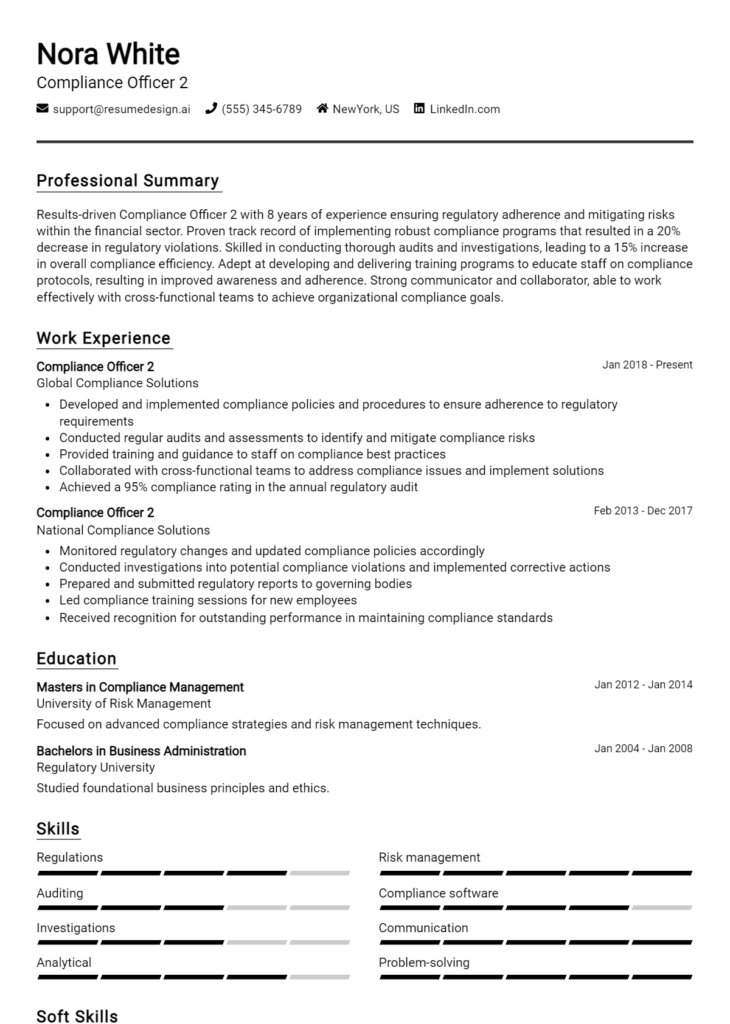Human Rights Consultant Core Responsibilities
A Human Rights Consultant plays a pivotal role in promoting and protecting human rights within organizations. Key responsibilities include conducting assessments, developing policies, and providing training across various departments. This role requires strong technical skills in legal frameworks, operational knowledge for effective implementation, and exceptional problem-solving abilities to address complex human rights issues. These skills are essential for aligning organizational practices with human rights standards, and a well-structured resume can effectively highlight these qualifications to demonstrate their value to potential employers.
Common Responsibilities Listed on Human Rights Consultant Resume
- Conduct comprehensive human rights assessments and audits.
- Develop and implement human rights policies and frameworks.
- Provide training and capacity-building sessions for staff.
- Collaborate with various departments to ensure compliance with human rights standards.
- Advise on human rights implications of organizational practices.
- Monitor and evaluate human rights initiatives and programs.
- Prepare reports and documentation for stakeholders.
- Engage with external organizations and human rights bodies.
- Facilitate stakeholder consultation processes.
- Identify and analyze emerging human rights trends and issues.
- Assist in crisis management and response strategies related to human rights violations.
- Support advocacy efforts to promote human rights awareness and education.
High-Level Resume Tips for Human Rights Consultant Professionals
In the competitive field of human rights consulting, a well-crafted resume serves as a crucial tool for professionals aiming to make a meaningful impact. As the first impression a candidate makes on a potential employer, the resume must effectively showcase not only the applicant's skills and achievements but also their passion for human rights advocacy. With the right approach, your resume can highlight your unique qualifications, relevant experiences, and commitment to social justice. This guide will provide practical and actionable resume tips specifically tailored for Human Rights Consultant professionals, ensuring that you stand out in a crowded job market.
Top Resume Tips for Human Rights Consultant Professionals
- Tailor your resume to the specific job description by incorporating relevant keywords and phrases.
- Highlight your experience in human rights work, including internships, volunteer positions, and professional roles.
- Quantify your achievements where possible, such as the number of cases worked on, reports published, or initiatives led.
- Emphasize your understanding of international human rights laws and frameworks, showcasing any certifications or relevant coursework.
- Include language proficiency, especially in languages pertinent to the regions you are applying to work in.
- Demonstrate your ability to work collaboratively in diverse environments, highlighting teamwork and cross-cultural communication skills.
- Showcase any relevant research skills, including experience with data analysis or policy advocacy.
- Utilize a clear and professional format to enhance readability and ensure that key information stands out.
- Incorporate any relevant publications or presentations that demonstrate your expertise in human rights issues.
- Maintain a focus on your passion for human rights, illustrating your commitment through your experiences and career goals.
By implementing these tips, you can significantly enhance your resume and increase your chances of landing a position in the Human Rights Consultant field. A well-structured and tailored resume not only reflects your qualifications but also conveys your dedication to advocating for human rights, setting you apart from other candidates in a meaningful way.
Why Resume Headlines & Titles are Important for Human Rights Consultant
In the competitive field of human rights consulting, a well-crafted resume headline or title serves as a crucial first impression. These succinct phrases can instantly capture the attention of hiring managers, providing a snapshot of a candidate's key qualifications and areas of expertise. An effective headline should be concise, relevant, and tailored to the specific job being applied for, ensuring it resonates with the employer's needs. By encapsulating a candidate’s unique strengths and experiences, a strong resume title can set the stage for further interest and engagement in the application.
Best Practices for Crafting Resume Headlines for Human Rights Consultant
- Keep it concise: Aim for one impactful phrase that summarizes your qualifications.
- Be role-specific: Tailor your headline to reflect the specific position you are applying for.
- Highlight key strengths: Focus on your most relevant skills, experiences, or accomplishments.
- Use action-oriented language: Choose words that convey your expertise and proactive approach.
- Avoid jargon: Ensure clarity by using language that is easily understood by all readers.
- Incorporate keywords: Include industry-relevant terms that align with the job description.
- Showcase value: Communicate how your background can contribute to the organization’s mission.
- Revise and refine: Continuously improve your headline based on feedback and changing job roles.
Example Resume Headlines for Human Rights Consultant
Strong Resume Headlines
“Experienced Human Rights Advocate with Proven Track Record in Policy Development”
“Dynamic Human Rights Consultant Specializing in Global Advocacy and Social Justice”
“Skilled Researcher and Consultant Committed to Advancing Human Rights Initiatives”
“Accomplished Human Rights Professional with 10+ Years of Field Experience”
Weak Resume Headlines
“Consultant Looking for Work”
“Human Rights Expert”
“Experienced Professional”
The strong headlines are effective because they provide specific information about the candidate’s qualifications, expertise, and experience, making them immediately relevant to hiring managers. They create a clear picture of the candidate's value proposition and align well with the expectations of the role. In contrast, the weak headlines lack specificity and fail to communicate any real strengths or unique qualities, which can lead to a lack of interest from potential employers. A strong, tailored headline is essential for making a memorable first impression in the competitive field of human rights consulting.
Work Experience Section for Human Rights Consultant Resume
The work experience section of a Human Rights Consultant resume is paramount, as it serves as a critical platform to demonstrate the candidate's technical skills and ability to manage teams effectively. This section allows potential employers to assess how well a candidate can deliver high-quality outcomes in challenging environments. By quantifying achievements and aligning their experience with industry standards, candidates can provide compelling evidence of their expertise and impact in the field of human rights. Clear and measurable accomplishments not only showcase technical proficiency but also highlight the candidate's commitment to advocating for justice and equality.
Best Practices for Human Rights Consultant Work Experience
- Use action verbs to describe your roles and responsibilities, emphasizing your active contributions.
- Quantify achievements where possible, such as the number of projects completed or percentage improvements in specific metrics.
- Highlight collaboration with diverse stakeholders, showcasing your ability to work in multi-disciplinary teams.
- Align your experience with industry standards and best practices to demonstrate your knowledge of current trends and issues.
- Include specific technical skills relevant to human rights consulting, such as data analysis, policy development, or advocacy strategies.
- Tailor your work experience descriptions to the job you are applying for, ensuring relevance and impact.
- Provide context for your achievements to help potential employers understand the significance of your contributions.
- Maintain a clear and concise format that is easy to read and follow, ensuring your key points stand out.
Example Work Experiences for Human Rights Consultant
Strong Experiences
- Led a team of 10 in the development of a comprehensive report on human trafficking, resulting in a policy change that improved victim support services by 30%.
- Implemented a training program for local NGOs on human rights advocacy, reaching over 150 participants and increasing their engagement in policy discussions by 50%.
- Conducted a detailed analysis of human rights violations in a conflict zone, influencing international funding decisions that allocated $2 million to humanitarian aid.
- Collaborated with government officials to create a new framework for minority rights, successfully advocating for legal reforms that were adopted by 5 regional governments.
Weak Experiences
- Assisted in various human rights projects without specifying contributions or outcomes.
- Participated in meetings and discussions about human rights issues.
- Worked on some reports related to human rights that didn't lead to any noticeable changes.
- Helped with general administrative tasks for a human rights organization.
The examples provided illustrate the distinction between strong and weak experiences in a Human Rights Consultant resume. Strong experiences are characterized by specific, quantifiable outcomes, demonstrating clear leadership and collaboration, while weak experiences lack clarity, measurable achievements, and fail to convey the candidate's direct impact. By focusing on the former, candidates can create a compelling narrative that highlights their qualifications and readiness for the role.
Education and Certifications Section for Human Rights Consultant Resume
The education and certifications section of a Human Rights Consultant resume is crucial as it provides potential employers with insights into the candidate's academic background and professional qualifications. This section not only showcases the educational credentials that underpin the candidate's expertise in human rights issues but also highlights any industry-relevant certifications and continuous learning efforts that signify a commitment to staying current in the field. By detailing relevant coursework, specialized training, and recognized certifications, candidates can significantly enhance their credibility and demonstrate their alignment with the job requirements, making them stand out in a competitive job market.
Best Practices for Human Rights Consultant Education and Certifications
- Include degrees from accredited institutions that are relevant to human rights, law, or social justice.
- Highlight any advanced degrees, such as a Master's or PhD, which indicate a higher level of expertise.
- List industry-recognized certifications, such as those from reputable human rights organizations, to validate your qualifications.
- Detail relevant coursework that directly connects to human rights issues, such as international law, human rights advocacy, or policy analysis.
- Incorporate specialized training programs or workshops that demonstrate ongoing education and engagement with current human rights challenges.
- Use clear and precise language to describe your education and certifications, avoiding jargon that may confuse the reader.
- Arrange the information in reverse chronological order, giving priority to the most recent and relevant qualifications.
- Consider including honors or distinctions that reflect your academic achievements and dedication to the field.
Example Education and Certifications for Human Rights Consultant
Strong Examples
- M.A. in Human Rights and Social Justice, University of XYZ, 2022
- Certified Human Rights Professional (CHRP), Human Rights Institute, 2021
- Relevant Coursework: International Human Rights Law, Gender and Human Rights, Policy Advocacy Strategies
- Certificate in Conflict Resolution and Peacebuilding, ABC Institute, 2020
Weak Examples
- B.A. in Business Administration, University of ABC, 2010
- Certification in Project Management, PMP Institute, 2018
- Relevant Coursework: Introduction to Marketing, Financial Management
- High School Diploma, XYZ High School, 2005
The strong examples provided highlight relevant degrees, certifications, and coursework that are directly related to the role of a Human Rights Consultant, showcasing the candidate's expertise and commitment to the field. In contrast, the weak examples illustrate qualifications that do not align with the human rights focus, such as degrees and certifications in unrelated fields, which may detract from the candidate's suitability for the position. Selecting the right educational qualifications and certifications is essential to effectively communicate one's competence in human rights advocacy.
Top Skills & Keywords for Human Rights Consultant Resume
In the field of human rights consulting, possessing the right skills is crucial for effectively advocating for social justice and influencing policy changes. A well-crafted resume that highlights both hard and soft skills can significantly enhance a candidate's prospects in this competitive field. Skills not only showcase a consultant's expertise and technical knowledge but also reflect their ability to communicate, collaborate, and navigate complex human rights issues. By emphasizing these skills, candidates can better demonstrate their value to potential employers and the impact they can make in promoting and protecting human rights globally.
Top Hard & Soft Skills for Human Rights Consultant
Soft Skills
- Excellent communication skills
- Strong analytical thinking
- Empathy and cultural sensitivity
- Conflict resolution abilities
- Team collaboration and leadership
- Problem-solving skills
- Adaptability to diverse environments
- Negotiation skills
- Public speaking and presentation skills
- Networking and relationship-building
Hard Skills
- Familiarity with international human rights laws
- Proficient in data analysis and reporting
- Experience in legal research and documentation
- Knowledge of advocacy strategies
- Project management expertise
- Ability to conduct needs assessments
- Competence in grant writing and fundraising
- Proficiency in languages (e.g., Spanish, French, Arabic)
- Understanding of policy analysis and development
- Experience with community engagement and outreach
For more insights on how to showcase your skills and effectively present your work experience, consider tailoring your resume to highlight these essential attributes.
Stand Out with a Winning Human Rights Consultant Cover Letter
Dear [Hiring Manager's Name],
I am writing to express my interest in the Human Rights Consultant position at [Organization Name], as advertised on [where you found the job listing]. With a robust background in human rights advocacy, policy analysis, and community engagement, I am excited about the opportunity to contribute to your organization’s mission of promoting justice and equality. My experience working with various non-profits and governmental organizations has equipped me with the analytical skills and cultural sensitivity necessary to navigate complex human rights issues effectively.
During my previous role with [Previous Organization Name], I led a project that focused on the protection and promotion of the rights of marginalized communities. This involved conducting comprehensive needs assessments, developing targeted advocacy strategies, and collaborating with stakeholders to implement effective interventions. My ability to communicate clearly and persuasively both in writing and in presentations has been essential in raising awareness and mobilizing support for our initiatives. Additionally, my fluency in [languages you speak] has enabled me to work effectively in diverse environments, ensuring that I can connect with and understand the unique perspectives of various communities.
I am particularly drawn to [Organization Name] because of your commitment to [specific aspect of the organization's work or mission]. I admire your innovative approaches to human rights challenges, and I am eager to bring my expertise in research and policy development to your team. I am confident that my proactive approach and passion for human rights will allow me to contribute meaningfully to your ongoing projects and initiatives. Thank you for considering my application. I look forward to the opportunity to discuss how my skills and experiences align with the goals of [Organization Name].
Sincerely,
[Your Name]
[Your Contact Information]
[LinkedIn Profile or Professional Website]
Common Mistakes to Avoid in a Human Rights Consultant Resume
Creating a compelling resume as a Human Rights Consultant is crucial for standing out in a competitive job market. However, many candidates make common mistakes that can undermine their chances of landing an interview. To ensure your resume effectively showcases your skills and experiences, it's essential to avoid these pitfalls:
Lack of Specificity: Using vague language or general terms can make it difficult for hiring managers to understand your contributions. Instead, quantify your achievements with specific examples and metrics.
Ignoring Keywords: Failing to incorporate relevant keywords from the job description may lead to your resume being overlooked by applicant tracking systems. Tailor your resume to include specific terms related to human rights, advocacy, and policy.
Overloading with Detail: While it's important to provide context, including excessive detail can clutter your resume. Focus on the most relevant experiences and keep descriptions concise.
Neglecting Professional Development: Not highlighting ongoing education, certifications, or training related to human rights can suggest a lack of commitment to the field. Include relevant courses, workshops, or seminars to demonstrate your dedication.
Using a Generic Format: A one-size-fits-all resume format can make your application blend in with others. Customize your layout and design to reflect your personality while maintaining professionalism.
Inadequate Focus on Impact: Concentrating solely on duties rather than the outcomes of your work can weaken your resume. Emphasize the impact of your initiatives and how they contributed to human rights advancements.
Poorly Written Content: Spelling and grammatical errors can create a negative impression of your attention to detail. Proofread your resume thoroughly or consider having someone else review it for clarity and correctness.
Failure to Tailor for Each Application: Sending out the same resume for multiple positions can be detrimental. Tailor each application to reflect the specific requirements and values of the organization you are applying to.
Conclusion
As we conclude our exploration of the Human Rights Consultant role, it's essential to reflect on the key competencies and experiences that can set you apart in this vital field. Human Rights Consultants must possess a deep understanding of international human rights law, excellent communication skills, and the ability to engage with diverse stakeholders. Furthermore, experience in advocacy, research, and policy analysis is crucial for effectively addressing human rights violations and promoting social justice.
In today's competitive job market, ensuring that your resume reflects these qualifications is paramount. A well-crafted resume can highlight your relevant experiences and skills, making a strong case for your candidacy. We encourage you to take the time to review and update your Human Rights Consultant resume to align with the expectations of potential employers.
To assist you in this process, consider utilizing available resources such as resume templates, which can provide a professional layout, or the resume builder that simplifies the creation of a standout resume. Additionally, explore resume examples for inspiration, and don’t forget about the importance of a compelling introduction with our cover letter templates.
Take action now—revamp your resume and position yourself for success in the impactful field of human rights consulting!

